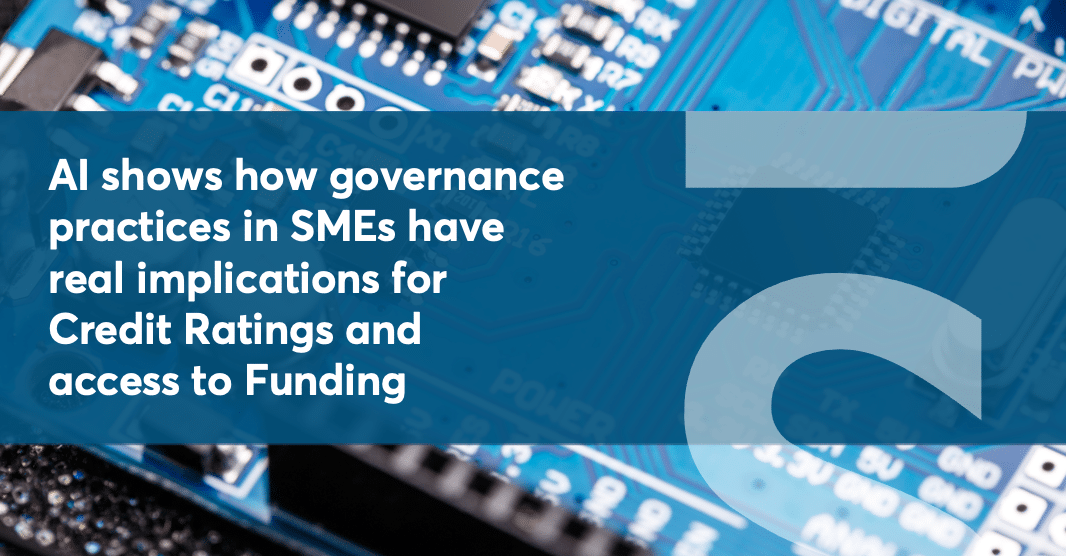We all agree that small and medium-sized enterprises (SMEs) play a crucial role in the economy, and effective governance practices are instrumental in their success. At INBONIS RATING we wanted to go further and show scientifically and using AI models the significance of implementing proper governance practices in small and medium-sized enterprises (SMEs) and its impact on the financial capital of the company, specifically focusing on credit ratings and access to diversified and suitable funding sources.
Thanks to our comprehensive database that includes over 500 European SMEs rated by INBONIS RATING and contains a wealth of information we gathered a valuable resource for advanced AI models, with over 50,000 data points, hundreds of rating drivers analysed, and more than 50 qualitative questions recorded for each SME.
How we used AI
Technically, to analyse the correlation between environmental, social, and governance (ESG) practices and credit ratings, ESG scores were developed for each of the 500+ rating reports using Natural Language Processing (NLP) models. NLP, a subset of Artificial Intelligence (AI), focuses on processing and understanding human-written text. In this study, three models built upon Google’s Bidirectional Encoder Representations from Transformers (BERT) model were utilized: FinBert, FinBert-ESG, and FinBert-ESG-9. Credit Rating Reports, which provided detailed information on companies and their methodologies, were analysed using these models.
To obtain the scores, over 500 Credit Rating Reports with detailed information on companies and their working methodologies where studied. Each sentence of the report was run through the models and scored based on the prevalence of each subject and the sentiment of the sentence itself. E.g. a company with a high mention of Climate Change but a high negative sentiment would score poorly in this subsection. To score each company the scores of either positive or negative sentences were averaged to obtain a final score for each of the identified sectors.
The key findings are striking
Our findings indicate a strong correlation between governance practices, as defined in this analysis, and credit ratings, consequently influencing the availability of financial capital for the company. Analysis of the rating distribution among the 500+ sample revealed that companies with lower governance scores obtained credit ratings ranging from CCC- to BB-, while those with higher governance scores achieved ratings from BB- to BBB, representing an average improvement of four notches.
This analysis further underscores the importance of SMEs having a credit rating, as it highlights the limited visibility of good governance practices through simple quantitative scores alone. Instead, it emphasizes the value of more comprehensive evaluations conducted by credit rating agencies (CRAs) such as Inbonis Rating, which delve deeper into assessing and understanding the intricacies of a company’s governance practices.
Israel Pérez
Israel a été directeur de l'exploitation d'INBONIS et responsable du développement de stratégies analytiques multiplateformes. Avec plus de 20 ans d'expérience dans le secteur bancaire international, il a travaillé chez BBVA pendant 18 ans, dont les 12 dernières années aux États-Unis, où il a assumé différentes responsabilités, telles que la gestion du risque de crédit des portefeuilles de détail ou les processus de détection des fraudes pour différents systèmes de paiement. Il a une grande expérience du développement de produits et de canaux de distribution, de la gestion des risques et des équipes de développement analytique aux États-Unis. Il a également siégé au conseil d'administration d'entités spécialisées dans les technologies financières (Fintech), comme Upturn, et d'organisations à but non lucratif, comme la Maison Ronald McDonald. Il est titulaire d'un diplôme en économie de l'Université d'Alcalá, est certifié « Financial Risk Manager » par le GAAP Institute et a suivi des études supérieures à la Northwestern University d'Evanston, dans l'Illinois.
